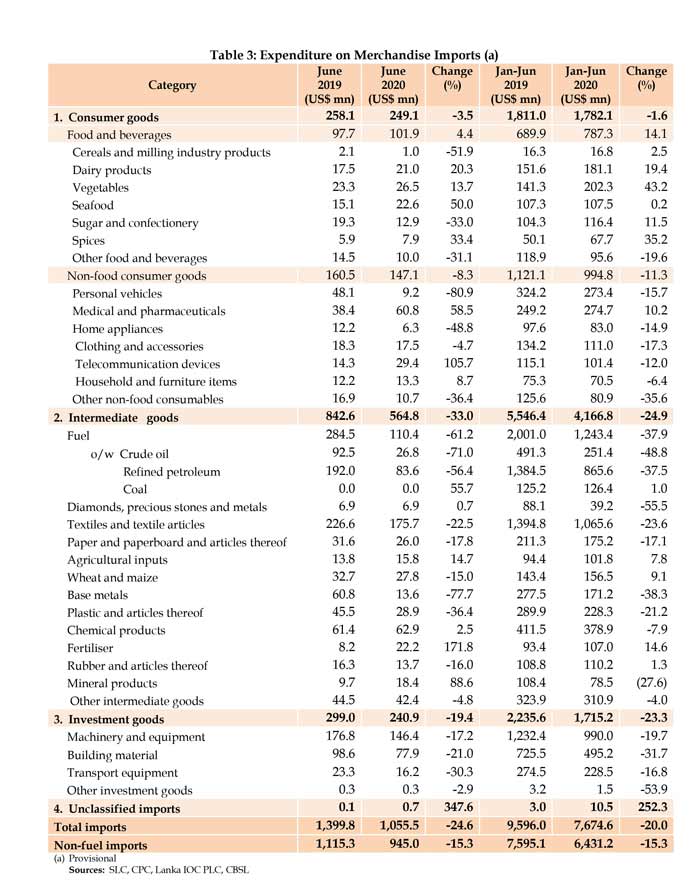August, 18, 2020

Expenditure on motor vehicle imports declined considerably by 80.9% while import of home appliances declined led by refrigerators and televisions during the month mainly due to the import restriction measures taken by the government and the Central Bank since March 2020, the Central Bank said in its latest report.
According to the CBSL, the declining trend observed in expenditure on merchandise imports from December 2019 to May 2020, reversed in June 2020, although a decline of 24.6% was recorded on a year-on-year basis.
In June 2020, expenditure on merchandise imports stood at US $ 1,055 million.
Expenditure on all major import sectors declined on a year-on-year basis in June 2020, with intermediate and investment goods imports declining the most.
This broad-based decline is attributable to the measures taken by the government and the Central Bank since March 2020 to restrict the importation of selected goods to mitigate the adverse effects created by the COVID-19 pandemic and also to the steep decline in expenditure on fuel imports.
Expenditure on intermediate goods contributed the most to the decline in import expenditure. Import of fuel in June 2020 declined significantly compared to June 2019 as a result of the decline in expenditure on refined and crude oil. This decline in expenditure stemmed from both the reduction in volumes imported and the lower prices of fuel in the international market.
The average import price of crude oil declined to US $ 38.35 per barrel in June 2020, compared to US $ 67.29 a year ago. Expenditure on imports of textile and textile articles declined significantly in June 2020 led by lower imports of fabric and yarn.
However, import expenditure on fertiliser (mainly urea), mineral products (mainly cement clinker), unmanufactured tobacco and agricultural inputs (mainly animal fodder) increased during the month compared to June 2019.
Expenditure on investment goods declined notably with the decline of all sub categories of investment goods in June 2020. Accordingly, expenditure on machinery and equipment (mainly medical and laboratory equipment), building material (mainly articles of iron and steel) and transport equipment (mainly commercial vehicles such as tankers and bowsers) declined in June 2020, compared with June 2019. However, expenditure on machinery and equipment parts and cement increased during the period under review.
Although expenditure on food and beverages increased, expenditure on consumer goods declined, due to the decline in expenditure on non-food consumer goods imports.
However, expenditure on medical and pharmaceuticals and telecommunication devices (mainly mobile phones) imports increased in June 2020. Meanwhile, import expenditure on food and beverages increased, led by import of seafood (mainly dry fish), dairy products (mainly milk powder), vegetables (mainly lentils), fats and oils (mainly coconut oil) and spices (mainly chillies and coriander seeds).
Both the import volume index and the unit value index declined by 13.2% and 13.1%, respectively, in June 2020, indicating that the decrease in imports was driven both by lower volumes and lower prices when compared to June 2019.

Video Story